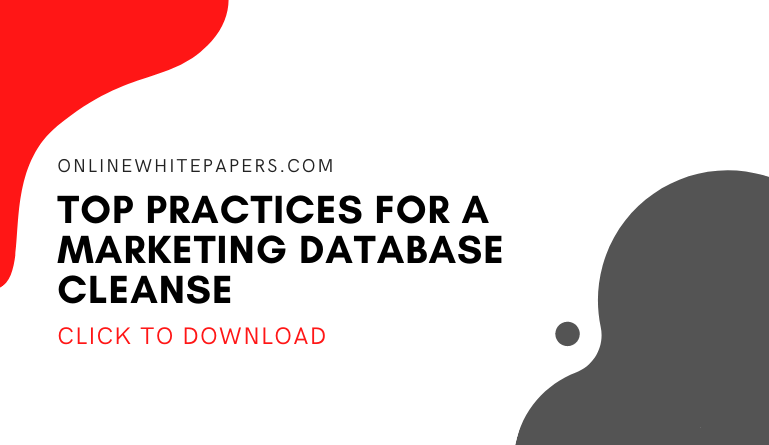Database marketing is an extension to direct marketing. It allows the increase of customer engagement and loyalty programs for businesses. One of the main reasons marketers use database marketing is due to its power to create a personal shopping experience for customers. Not only that, but it also improves the efficiency of your marketing.
The significance of Database Marketing
It is helpful to organizations in several ways. We discuss a number of those below:
-
Helps separate existing customers from new leads
It comes with the successful increase of new leads. Because database marketing has the skill of tracking consumers down based on their information from a database, it also allows the ability for businesses to separate new leads from existing customers that have been loyal to your business.
-
Prioritizes valuable accounts
It also comes with a focus on accounts that are deemed valuable to your company. You not only want to increase sales with database marketing but general awareness so that your business can be widely known to more consumers beyond the target audience you’re attracting. As for valuable accounts.
-
Allows the ability to protect customer behavior
As mentioned before, database marketing can track customer behavior. It also provides companies protection of customer behavior data, which is confidential information used to improve marketing.
-
Ability to test new ideas and products
Not only you can track buying behavior but rather gain the ability in testing out new products and ideas that can update how you market your business. Experimenting with products with the use of trends and ideas can increase innovative ideas that you can bring to the next campaign.
-
Used to gather feedback to understand your customers’ needs better
Marketers constantly try to find ways to gather information on customers. It does just that in a deeper sense. It gets under the surface of what your customers’ needs are and creates a better understanding of what to improve with your products.
-
Your brand stays relevant and top of mind
Since your brand will be well known far and wide by consumers as part of a database, it’s no secret that your brand will continue to stay relevant. Staying at the top of your business marketing game as well as staying relevant to customers is another perk to look forward to with the use of database marketing.
-
Increased customer retention by building relationships
Good businesses build good relationships with their customers. That’s what keeps them coming back, right? With the increased customer retention, customers will most likely stay loyal to your brand and keep shopping with you.
-
Establishes leadership credibility and brand affinity build-up
Brands for businesses not only begin to build up even more with database marketing but the credibility of leadership as well. The information that databases provide can be seen as the magic lead generation tool that can assist marketers on how to increase customer loyalty and brand awareness for the business itself.
-
Future promotional campaigns
Using information to your benefit can also help with future campaigns. When trying to promote your business with database information, it is best to save that information and apply useful feedback to your future promotions. This gives you enough insight to improve and execute your next marketing game plan.
Different Types of Database Marketing
-
Consumer Database Marketing
Consumer database marketing is database marketing that targets consumers using information such as a first and last name, email address, gender, phone number, and location data.
With consumer database marketing, marketers apply the concept of B2C or D2C marketing to their strategies. In essence, companies use this type of marketing to solely focus on growing a consumer database with different types of strategies. Examples of consumer database marketing can be seen in the chart below.
-
Business Database Marketing
As for business database marketing, companies who sell to other businesses use this form of database marketing to target more businesses. This practice is also known as B2B marketing.
Business database marketing differentiates from consumer database marketing in a way where it’s a slightly smaller database and mainly targets companies who can be considered valued accounts. Webinar events, free trial offers from software, and even whitepapers are prime examples of business database marketing.
Benefits of Database Marketing
There are several benefits. According to a 2020 report conducted by HubSpot(1), 68% of businesses use automation in some way. With the help of database marketing, businesses can seek the great help of customer databases. Read about how customer databases can elaborate as a strategy in terms of lead generation.
How Customer Databases Help
With the help of customer databases, businesses increase insight on buying behavior and have the ability to determine what’s in store for their target consumers overall. It’s the key tool to succeed in database marketing.
-
Identify customer groups – from your most loyal, high-value customers to first-time customers and occasional purchasers
Separating different customers into groups is an excellent practice. Sorting them out from your most high-valued to your first-time customers will keep customer groups nicely organized for customer databases.
-
Create detailed customer segments based on demographics, behaviors, or even personal interests
Coming up with detailed customer segments such as giveaways, contests, and discounts based on demographics, behaviors and personal interests can help build up your customer databases. The more engaged and creative you become with coming up with segments, the more customers you reel into your database.
-
Design highly personalized messages for both current and prospective customers
Creating personal messages for current customers can increase brand loyalty. As for prospective customers, this gives off a good impression and a warm welcome that can increase engagement.
-
Determine the best channel and time to engage customers
With the build-up of a customer database, marketers can determine what types of content can fit perfectly for certain platforms. This increases awareness and possible customer engagement from new users.
-
Improve your marketing efficiency by not wasting time and money sending campaigns to those who are unlikely to respond
Because the majority of database marketing focuses on numbers, you want to improve the efficiency of your marketing with campaigns. However, it’s also important to pay your money’s worth to responsive consumers. This mainly means that your time and money are precious and that simply wasting it on an unsuccessful campaign will lead to a dead end.
-
Build effective loyalty programs that provide the right incentives for repeat purchases
You’ve seen it or experienced this before. Loyalty programs that lead to nowhere. Building an effective loyalty program with the right incentives can help customers immensely. The purchases that are made with your business deserve to have loyal customers seeking perks for repeated purchases.
-
Improve customer service by providing support staff with a 360° view of the customer’s interactions with your brand
Support staff plays a role in this process of database marketing. That’s why your support staff must have a broad perspective on customer interactions with your brand in order to improve the customer service of your business.
Challenges of Database Marketing
There are lots of ways to collect data to succeed with marketing. However, the overwhelming amount of tools to track information on marketing data can lead to fragmented systems within the marketing department of your business. In the end, having less is more rather than the other way around.
( Also Read: Challenges & Actionable Solutions for Database Marketing )
Steps to Building a Marketing Database
-
Develop thought leadership articles
Articles are another way of engaging with target audiences. Writing leadership articles can also increase a marketing database. It’s the first step to staying relevant and keeping your customers hooked.
-
Offer free trials
Whether it’s software or a type of service you promote, it’s effective to offer free trials to customers. When you allow customers free trials, you’re giving them time to try out your new product as well as promoting it subtly.
-
Create a free tool to use
Aside from free trials, coming up with tools can also increase database marketing. Features are a big deal for customers. See this as an opportunity to create and release a new tool that users can use for free.
-
Collect customer information during checkout
Since you’re collecting data from location, address, emails, and texts, what better way than to extend different ways to collect customer information. During checkout, a majority of cashiers tend to ask if customers would like to join a rewards program. This is a tactic that increases database marketing so well because you simply get the customer’s information right then and there.
-
Acquire a business contact database of your ideal prospects from a data provider
Having a business contact database assists with a data provider can increase your chances of staying in the marketing game. When you have a contact database of ideal prospects, you increase a list of go-to people that can effectively work with your business.
-
Collect website visitor data via online cookies
Every user encounters this. It’s a pop-up ad that asks if you would like to turn on and accept online cookies. Most businesses do this as a way to collect your visitor data, which then they used to increase and improve database marketing engagement.
-
Create a Facebook Chatbot on your business page
Establishing a live chat feature or Facebook Chatbot can increase your chance of more user interaction. This not only engages with potential customers but improves the support that customers can get from your business 24/7.
Difference Between Database Marketing and Direct Marketing
| Database Marketing | Direct Marketing |
|---|---|
| A form of direct marketing | The oldest form of marketing |
| It involves the collection of customer data in order to create personalized | Direct marketing solely relies on direct distribution or communication to consumers |
| It tracks buying behaviors, and offer post-purchase feedback as well as online reviews | Direct marketing is presented to potential customers based on information that’s been gathered about them |
| Examples of database marketing include: Free trials, Loyalty Programs, Personalized emails, Free shipping offers, Online Contests, Social media giveaways, Discount codes | Examples of direct marketing include: Texts, Emails, Brochures, Fliers, Newsletters, Targeted online display ads, Coupons |
Final Thoughts
There are different approaches to database marketing. The only difference between database marketing and direct marketing is that one form of marketing mainly attracts and markets to other businesses and another traditionally attracts customers directly.
There are plenty of reasons why database marketing is a popular marketing strategy for businesses. However, it all comes down to the challenge of building up a marketing database with relevant content.
Overall, businesses that use database marketing can have a better chance at reaching out to loyal and new customers because of the relevancy that database marketing brings.







